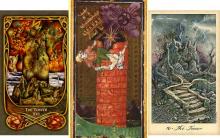In 1862, Turgenev describes the novel "Fathers and Sons." At that very time, a final break is emerging between two social camps: liberal and revolutionary-democratic. In his work, Turgenev showed a man of a new era. This is the democrat commoner Bazarov.
Throughout the entire novel, his friend Arkady stays next to Bazarov. They study together at the medical faculty of the university. They are connected by several years of friendship.
Arkady falls under the influence of Bazarov and wants to be like him. He wholeheartedly shares his views.
Arkady is forced to join the nihilists by “young courage and youthful enthusiasm.” But he is not guided by Bazarov’s ideas in life. They do not become an organic part of him, which is why Arkady will so easily abandon them later. The revolutionary democratic ideal of happiness is for the benefit of the people, despite personal adversity. Arkady is not ready for this, since he is a “soft liberal baric.” In their “youthful enthusiasm,” liberals do not go beyond noble ebullience, but for Bazarov this is “nonsense.” Liberals do not “fight,” but “imagine themselves to be great; revolutionaries want to fight.” Giving an assessment of Arkady, Bazarov identifies him with the entire liberal camp. Spoiled by life in a noble estate, Arkady “involuntarily admires himself,” he enjoys “scolding himself.” This is boring for Bazarov, he “needs to break others.” Arkady just wanted to look like a revolutionary; there was a lot of youthful posturing in him, but in his soul he always remained a “liberal gentleman.”
Arkady appreciates Bazarov for his willpower, energy, and ability to work. At the Kirsanov estate, Bazarov is received cordially. Arkady asks his family to take care of their friend. But Bazarov’s revolutionary democracy does not at all fit in with the liberal aristocracy of the Kirsanov house. He does not fit into their life, full of idleness. And in this place, on a visit, Bazarov continues to work. The lifestyle of friends on the estate is expressed in one phrase: “Arkady was a sybaritist, Bazarov worked.”
Bazarov considers nature not a temple, but a workshop, and a person in it as a worker. For Arkady, as for all the Kirsanovs, nature is an object of admiration and contemplation. Bazarov objects to the prayerful contemplation of nature, the lordly enjoyment of its beauty. He requires an active attitude towards her. He himself treats nature as a caring owner. Nature pleases him when he sees the fruits of man's active intervention in it.
Friends have different attitudes towards love. Bazarov is a skeptic here. He says that only a fool can feel free with a woman. However, meeting Odintsova changes his views on love. But Odintsova is an epicurean young lady. Peace is above all else for her. And she does not allow the feeling that is emerging in her for Bazarov to flare up.
Arkady’s ideal is precisely in the family, on the estate, which he is even more convinced of after meeting Katya.
Bazarov is close to serfs. For them he is “a brother, not a master.” This is confirmed by his speech, which contains many popular proverbs and sayings. Arkady, for his peasants, always remains a master, a master.
Bazarov is too demanding of himself. He tells Arkady that “every person must educate himself.” His nihilism leads him to become ashamed of natural human feelings. He seeks to suppress their manifestations in himself. Hence, Bazarov’s dryness, moreover, in relation to people close to him. But when asked by Arkady whether Bazarov loves his parents, he answers simply and sincerely: “I love you, Arkady!”
Bazarov's nihilism leads to the denial of old and new art. For him, “Raphael is not worth a penny...”. He believes that “at 44 years old, playing the cello is stupid,” and reading Pushkin is “no good.” He considers art a form of profit. For him, “a decent chemist is more useful than any poet,” and art is not capable of changing anything in life. And this is the extreme of Bazarov’s nihilism. The hero emphasizes the importance of scientists for Russia, since Russia then lagged behind the West in science.
Arkady and Bazarov seem to be opposing each other, and this is the conflict of the novel, revealed by the technique of contrast.
Thus, the breakup between Bazarov and Arkady is inevitable. Arkady is not ready for the “tart, bitter, bourgeois life” of a democrat. And friends say goodbye forever. Bazarov breaks up with Arkady without saying a single friendly word to him. He says that he has other words for Arkady, but to lay them out is romanticism for Bazarov.
Bazarov dies, remaining true to his convictions. It is before death that their strength is tested. Nihilistic beliefs did not take root in Arkady. He understands that the life of a revolutionary democrat is not for him. Bazarov dies a nihilist, and Arkady remains a “liberal gentleman.”
In 1862, Turgenev wrote the novel “Fathers and Sons.” During this period, a final break was outlined between two social camps: liberal and revolutionary-democratic. In his work, Turgenev showed a man of a new era. This is the democrat commoner Bazarov.
Throughout the entire novel, his friend Arkady is next to Bazarov. They study together at the medical faculty of the university. They are connected by several years of friendship.
Arkady falls under the influence of Bazarov and wants to be like him. He sincerely shares his views.
Arkady is forced to join the nihilists by “young courage and youthful enthusiasm.” But he is not guided by Bazarov’s ideas in life. They do not become an organic part of him, which is why Arkady will so easily abandon them later. The revolutionary democratic ideal of happiness is activity for the benefit of the people, despite personal adversity. Arkady is not ready for this, since he is a “soft liberal barich.” In “youthful enthusiasm,” liberals do not go beyond noble ebullience, but for Bazarov this is “nonsense.” Liberals do not “fight,” but “imagine themselves to be great; revolutionaries want to fight.” Giving an assessment of Arkady, Bazarov identifies him with the entire liberal camp. Spoiled by life in a noble estate, Arkady “involuntarily admires himself,” he enjoys “scolding himself.” This is boring for Bazarov, he “needs to break others.” Arkady just wanted to seem like a revolutionary; there was a lot of youthful posturing in him, but in his soul he always remained a “liberal gentleman.”
Arkady appreciates Bazarov for his willpower, energy, and ability to work. At the Kirsanov estate, Bazarov is received cordially. Arkady asks his family to take care of their friend. But Bazarov’s revolutionary democracy does not fit in at all with the liberal aristocracy of the Kirsanov house. He does not fit into their life, full of idleness. And here, as a guest, Bazarov continues to work. The lifestyle of friends on the estate is expressed in one phrase: “Arkady was a sybarite, Bazarov worked.”
Bazarov considers nature not a temple, but a workshop, and a person in it as a worker. For Arkady, as for all the Kirsanovs, nature is an object of admiration and contemplation. Bazarov objects to the prayerful contemplation of nature, the lordly enjoyment of its beauty. He requires an active attitude towards her. He himself treats nature as a caring owner. Nature pleases him when he sees the fruits of man's active intervention in it.
Friends have different attitudes towards love. Bazarov is a skeptic here. He says that only a fool can feel free with a woman. However, meeting Odintsova changes his views on love. But Odintsova is an epicurean young lady. Peace is above all else for her. And she does not allow the feeling that is emerging in her for Bazarov to flare up.
Arkady's ideal is precisely in the family, in the estate, of which he is even more convinced after meeting Katya.
Bazarov is close to serfs. For them he is “a brother, not a master.” This is confirmed by his speech, which contains many popular proverbs and sayings. Arkady, for his peasants, always remains a master, a master.
Bazarov is too demanding of himself. He tells Arkady that “every person must educate himself.” His nihilism leads him to become ashamed of natural human feelings. He seeks to suppress their manifestations in himself. Hence Bazarov’s dryness even towards people close to him. But when asked by Arkady whether Bazarov loves his parents, he answers simply and sincerely: “I love you, Arkady!”
Bazarov's nihilism leads to the denial of old and new art. For him, “Raphael is not worth a penny...”. He believes that “at 44 years old, playing the cello is stupid,” and reading Pushkin is “no good.” He considers art a form of profit. For him, “a decent chemist is more useful than any poet,” and art is not capable of changing anything in life. And this is the extreme of Bazarov’s nihilism. The hero emphasizes the importance of scientists for Russia, since Russia then lagged behind the West in science.
Arkady and Bazarov seem to oppose each other, and this is the conflict of the novel, expressed by the technique of contrast.
Thus, the breakup between Bazarov and Arkady is inevitable. Arkady is not ready for the “tart, bitter, bourgeois life” of a democrat. And friends say goodbye forever. Bazarov breaks up with Arkady without saying a single friendly word to him. He says that he has other words for Arkady, but to express them is romanticism for Bazarov.
Bazarov dies, remaining true to his convictions. It is before death that their strength is tested. Nihilistic beliefs did not take root in Arkady. He understands that the life of a revolutionary democrat is not for him. Bazarov dies a nihilist, and Arkady remains a “liberal gentleman.”
The novel “Fathers and Sons” by Turgenev was written in 1862. As D.I. Pisarev notes, the work is devoid of both the beginning and the denouement. There is no clear, deliberate plan here. But at the same time, the novel describes completely different types and characters, and there are vividly drawn pictures. Here you can clearly feel Turgenev’s attitude towards his characters and the events unfolding on the pages of the novel.
At the beginning of the novel we see that Arkady is completely under the influence of his friend Bazarov. Despite the fact that he often gets into arguments with him, he idolizes his older friend. Arriving home, Arkady is even somewhat embarrassed by his family in front of Bazarov. He speaks deliberately casually with his father and uncle, trying to show that he is already a fully grown and independent person. Unlike Bazarov, Arkady is still developing as a person. He absorbs everything new and quickly falls under the influence of those around him. So, for example, Odintsova, having a great understanding of people, immediately begins to treat Arkady as a younger brother. Despite the admiration for Bazarov, already at the beginning of the novel one can notice differences in the views of the friends. Arkady is more humane, gentle, he does not reject feelings, he loves art and nature. Bazarov is interesting to the young man as a strong independent personality, but it cannot be said that Arkady unconditionally accepts all his friend’s reasoning. He is dissatisfied when a friend, with his characteristic cynicism, thinks about the young man’s relatives, about Anna Sergeevna Odintsova, and in general about the people around him. Bazarov treats Arkady more as an obedient student and comrade-in-arms than as a friend. All arguments with a friend are somewhat instructive in nature. When a young man calls on a friend to take pity on Pavel Petrovich, Bazarov sharply replies that he does not consider the man “who put his whole life on the line for women’s love” to be a real man, a “male.” Next comes the idea that “every person must educate himself.” Bazarov does not hesitate to set himself as an example, knowing that Arkady is fascinated by his ideas as a nihilist. The more the young man gets to know his friend, the closer he gets to know him, the more often he has the idea that Bazarov is contradicting himself. So, for example, he notices with surprise that Evgeny feels shy in front of Odintsova and behaves unnaturally cheekily. Although he previously convinced Arkady that the relationship between a man and a woman can be fully explained from the point of view of physiology. The young man subtly senses the change in Bazarov when he falls in love with Anna Sergeevna. At first, he feels jealous and upset about the current state of affairs. However, he quickly resigns himself, recognizing the superiority of his friend, and directs all his attention to Odintsova’s younger sister Ekaterina Sergeevna.
I think Bazarov is attracted to Arcadia by his youth, freshness of perception, liveliness of feelings. He is somewhat flattered by his younger friend's reverent attitude towards himself. He condescends to become friends with Arkady, easily refuting all his friend’s arguments about feelings, women, and art. Arcadia has something that Bazarov does not have: a naive, unclouded perception of the world by cynicism, the ability to enjoy life and find the bright sides in it.
A split in the relationship between friends begins to emerge in Maryino, in Arkady’s house. The young man does not agree with Bazarov’s opinion that Nikolai Petrovich is a “retired man” and “his song is over.” Arkady is not able to “throw away” a person, even if his views are outdated. Be it a father or just a stranger. The culmination of tension in the relationship between friends can be considered the moment when Bazarov speaks out about Sitnikov’s arrival: “I need such boobies... It’s not really for the gods to burn pots...” Only now before Arkady “the whole bottomless abyss opened up for a moment Bazarov's pride." The young man begins to understand how his friend treats him, but out of old habit he still tries to maintain friendly relations with Bazarov. Leaving Odintsova, he begs to go to a friend’s tarantass, although “twenty-five miles seemed like as much as fifty.” Arkady was unpleasantly surprised by how Bazarov treated his parents, which also did not help strengthen the friendship between friends. The young man gradually leaves the influence of his friend. He falls in love with Katya and gradually becomes imbued with her views on life. Bazarov understands his friend’s condition very well. He realizes that the friendship has come to an end, that it is time to say goodbye to his old friend forever. In a conversation with Arkady, Evgeniy asserts that he “has neither insolence nor anger” and that therefore he is not suitable for the job. He considers his friend to be too soft a gentleman, a romantic, and understands how far he and Arkady are from each other. Bazarov does not consider it necessary to continue friendly relations. By and large, he never perceived Arkady as a friend, since he is a loner by nature. Therefore, having parted with the young man, Bazarov erases him from his memory. When his father suggests that Evgeny, who is dying of infection, send for a friend to say goodbye, he has difficulty remembering the name of Arkady Kirsanov and refuses to meet with him.
Bazarov and Arkady. The theme of friendship. Friendship is the spiritual closeness of people, mutual understanding, willingness to understand another person, to help him in a difficult situation. If there is no mutual understanding between friends, then there can be no true friendship. I. S. Turgenev writes about this in the novel “Fathers and Sons”.
Its main character is Evgeny Bazarov. He is a man of new times, a nihilist. Bazarov is interested in natural sciences, is preparing to become a doctor, dreams of transformations in Russia, of improving the life of the peasantry. Arkady Kirsanov is drawn to Bazarov precisely because he is not like others and is passionate about new ideas. Kirsanov tries to imitate his friend. But for Bazarov, Arkady is a young boy, a romantic, whom he treats with condescension.
Arkady and Evgeny were raised in different conditions. Kirsanov grew up in his father's rich landowner's house, and from childhood he was surrounded by parental care and affection. Life in the village flowed sleepily and leisurely. Nikolai Petrovich, his father, lived like other landowners, “occasionally went hunting and took care of the farm.”
Evgeniy's parents live much more modestly, in a small village house covered with a thatched roof. His family is closer to the common people: his father is a former military man, his mother is “a real Russian noblewoman of the past.” They live the old fashioned way, accustomed to work. And Evgeniy, in a dispute with Pavel Petrovich, proudly declares: “My grandfather plowed the land.” Evgeny was used to working since childhood, and even on vacation at the Kirsanov estate, “Arkady was sybaritizing, Bazarov was working.” He conducts experiments on frogs and treats ordinary people. Arkady strives to help his friend, but I think that natural sciences are not his passion. He is closer to nature, music, poetry. And yet Kirsanov is drawn to Bazarov as a person; it is not for nothing that he pronounces the word “nihilist” with such pathos. In the Kirsanovs' house, Bazarov is a stranger, the old people do not share his beliefs, they have their own principles.
It is strange to them that Bazarov denies art, poetry, religion, love. And it’s hard for Arkady to understand his friend’s beliefs, although he supports him. Kirsanov Jr. finds his happiness in his love for Katya Odintsova, because these heroes have a lot in common.
Family happiness is important to Arkady. Bazarov falls in love with Katya's sister, Anna Odintsova. However, Anna rejects his feelings. Gradually, Bazarov and Arkady become more and more distant from each other, because they do not have common interests. Moreover, Evgeny himself pushes his friend away: “You are a gentle soul, a weakling, where can you hate!.. You are a nice fellow, but you are still a soft, liberal gentleman...”.
In my opinion, Bazarov himself is to blame for his loneliness. None of the people around him understand or accept nihilism. Evgeny himself pushes away both his sweet, kind parents and Arkady. Kirsanov is sorry to say goodbye to his friend, because his soul cannot hate someone or push someone away. If you want to have real friends, you must accept them, perhaps come to terms with some shortcomings, and not impose your opinion. The strong, of course, can subjugate the weak, but this is not friendship, but only admiration. True friendship is built on mutual understanding, common interests and the ability to give in.
However, Turgenev shows a deep difference between the main character and his “students”. Such a “student” is Arkady Kirsanov. Unlike the commoner, Bazarov is a young man from a noble family. From the very first pages of the novel we see friends nearby. And right away the author makes it clear how much Arkady depends on his friend, but is far from being like him in everything.
Admiring nature in a conversation with his father, the son suddenly “casts an indirect glance back and falls silent.” Arkady is under the spell of the Senior Comrade's personality, feels in him a wonderful, perhaps great, person, and delights in developing his ideas, shocking his uncle, Pavel Petrovich. But deep down, Arkady is completely different: he is not alien to poetry, tender feelings, and loves to “speak beautifully.” Nihilistic beliefs do not become his nature. Gradually, a conflict is brewing between the Friends, Arkady increasingly disagrees with his friend, but at first he does not dare to speak directly about it, more often he remains silent. Saying goodbye to Arkady, Bazarov gives an accurate assessment of the personality of his friend, emphasizing the differences between them: “You were not created for our bitter, tart, bourgeois life. You have neither insolence nor anger, but there is youthful courage and youthful enthusiasm, for our cause this is no good. Your noble brother cannot go further than noble humility or noble boiling...
but we want to fight..." In essence, Arkady is a "soft liberal barich." Bazarov's powerful negation of everything, dreams of fundamental changes in public life, the desire to "clear the place" are alien to him. Evgeny is consistent in his views, Sometimes he reaches the point of cynicism. Turgenev emphasizes that Arkady is offended by his friend’s cynical statements. And Kirsanov’s character requires constant dependence on someone. Previously, he obeyed Evgeniy, now - Failure befalls Evgeniy in his personal life - he fell in love with the landowner Odintsova. This love broke Bazarov. unsettled him, in the last chapters he is no longer the same as we knew him at the beginning of the novel.
Unhappy love leads Bazarov to a severe mental crisis. Everything falls out of his hands, and his infection itself seems not so random. Bazarov dies without having time to accomplish anything. Before death, which he meets simply and courageously, the hero seems to realize that his time has not yet come. Turgenev made him a heroic, noble person, but doomed to death. I believe that this novel will forever remain one of the most mysterious works of world literature, along with Griboyedov’s “Woe from Wit.”
These books reflect the eternal contradictions of human life - the maximalism of youth and worldly wisdom, uncompromisingness... Which is better? The answer to this is in eternity, in the calmness of “indifferent nature,” in the last, reconciling lines of the novel. Roman I. S.
Turgenev was written in the 60s of the last century. This is a novel about “new” people. I. S. Turgenev's novel "Fathers and Sons" is about the conflict, the confrontation of the old generation with the Established system of moral principles, mores and the new with modern views, principles, ideals. The problem of the conflict between “fathers and sons” has always existed, it is relevant at any time. Everything new introduced by the younger generation runs into a wall of misunderstanding. In our case, this is Bazarov’s confrontation with the older generation. Bazarov and Arkady became friends while studying at the university.
Bazarov was a convinced nihilist. Arkady's views and beliefs were formed under his influence. Arkady is not completely convinced of his idea; he tries to imitate Bazarov. Arkady wants to be the same as Bazarov, he wants to be like him, but internally he is not the nihilist that he pretends to be. Bazarov is ready to challenge his point of view to the end (as he does with Pavel Petrovich), and it is impossible to dissuade him of his views. Arkady is easy to convince of the incorrectness of his views.
Bazarov really understands what he believes in. Arkady does not understand the seriousness of their beliefs. He wants to be like his comrade. But Arkady cannot be similar due to an internal feature - character.
Bazarov has a strong, unshakable character, he is a free person, he is constant in the choice of his beliefs. Arkady's character is flexible and soft. He is easily influenced by others. Arkady is devoid of mental originality and constantly needs someone's intellectual support; in comparison with Bazarov, he seems like a youth not ready for independent life. Reverently before his teacher, Arkady gladly denies what Bazarov denies, submitting to his influence. Bazarov's attitude towards his friend reveals his character. He is Alone, on his own with his own thoughts and beliefs. Most often, he does not want to speak out, withdraws into himself and occasionally drops a word.
Arkady happily picks up the phrase expressed by Bazarov. Arkady doesn't love his friend either, he simply submits to the power of his mind. His attitude towards Bazarov is feigned. He simply got to know him, became interested in his principles, submitted to his power and imagined that he loved him from the bottom of his heart. And Bazarov is one of those people who loves to teach, educate, point out. The relationship between Bazarov and Arkady cannot be called friendship, they are mutually dependent, they need each other not as friends, but as teacher and student. Despite the fact that Bazarov and Arkady are friends and are united by a common idea, they are completely different people with different characters.
The novel "Fathers and Sons" was created at a time when the question of the abolition of serfdom was raised, when there were contradictions between liberals and democrats. After the release of the novel, a flurry of critical articles fell upon him. As a true artist, creator, Turgenev was able to guess the mood of his time, the emergence of a new type, the type of commoner democrat, who replaced the noble intelligentsia. The main problem posed by the writer in the novel is already heard in the title “Fathers and Sons.” This name has a double meaning. On the one hand, this is a problem of generations, an eternal problem of classical literature, on the other hand, a conflict between two socio-political forces operating in Russia in the 60s of the 19th century: liberals and democrats.
In I. S. Turgenev's novel "Fathers and Sons" the main characters are Bazarov and Arkady Kirsanov. The characters are grouped depending on which socio-political grouping we classify them as. But the fact is that the main character Evgeny Bazarov turns out to be the only representative of the camp of commoner democrats.
All other heroes are in the opposite camp. Bazarov is a new person, a representative of those young figures who “want to fight,” “nihilists.” He is for a new life and remains true to his convictions to the end. He is the main and only exponent of democratic ideology. Arkady Kirsanov also belongs to the political camp of the “fathers” in his views on life. True, he is sincerely interested in Bazarov’s theory, strives to imitate him and pretends to be the same nihilist as his friend. However, often forgetting about his “nihilism”, about his new role, Arkady reveals an ideological kinship with the “fathers”.
It is no coincidence that he defends them every now and then: in one chapter he tries to convince Bazarov that Pavel Petrovich is a “good man” and Nikolai Petrovich is a “golden man”. Bazarov is the enemy of abstract science, divorced from life. He is for science that would be understandable to the people. Bazarov laughs at his father’s medicine because it is behind the times. Bazarov is a worker of science, he is tireless in his experiments, completely absorbed in his favorite profession. Arkady is completely different, we feel that this person is somehow sluggish, weak, limited.
The image of Arkady reveals the failure of liberals. Arkady discovers his blood and ideological kinship with the liberals in a number of other places in the novel. When characterizing characters, Turgenev most often uses dialogue and portraits. Dialogue is the most suitable form for conveying the essence of the political and philosophical pores Occurring in the novel.
In an unusually sharp dialogue, the main conflict between Bazarov and Arkady Kirsanov is revealed. “Your brother is a nobleman,” Bazarov says to Arkady, “can’t go beyond noble humility or noble boiling, and this is nothing. You, for example, don’t fight - and you already imagine yourself to be great, - but we want to fight.” He disagrees with Arkady in the main thing - in his idea of life, about the purpose of man.
Their relationship cannot be called friendship, because friendship is impossible without mutual understanding, friendship cannot be based on the subordination of one to the other. Throughout the entire novel, the subordination of a weak nature to a stronger one is observed: Arkady to Bazarov. Over time, Arkady acquires his own opinion and no longer blindly repeats Bazarov’s judgments and opinions of the nihilist, and expresses his thoughts. The difference between the heroes is visible in their behavior in the Kirsanov “empire”. Bazarov is busy with work, studying nature, and Arkady is idle.











What is consolidated reporting?
Statutory audit - grounds for conducting an audit
What can you cook from chicken?
How to fry pasta in a frying pan
Instant cabbage pieces: recipes for pickling with carrots and beets